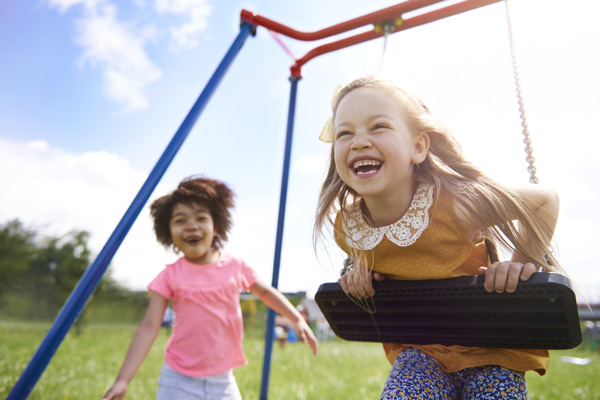Now that beautiful spring weather has finally arrived, young children, parents, and caregivers can enjoy fun, active outdoor play. Young children can learn new movement activities and new vocabulary words in both their heritage language and in English. Active play provides opportunities for children to link their physical movements with the new words they are learning. They are learning new action words in the context of performing the action. For example, as a child skips down the sidewalk, the caregiver can repeat the word skip in the child’s heritage language and in English. Newly learned action words can be used in sentences, “I can see you climb on the playground toys.”
Playing “bitty basketball” or kicking a soccer ball with young children provides opportunities to teach active words in both languages: kick, throw, catch, bounce, toss, and roll. Young children learn best while active so outdoor physical play can help build upon a child’s vocabulary knowledge and extend her understanding of new words. Parents may want to share specific new vocabulary words associated with outdoor games they enjoy (e.g., baseball, softball, soccer). Using a digital camera or phone camera, adults can take pictures of the children engaged in physical play and add the printed heritage language word and English word to the photograph. These could be displayed in preschool classrooms or at home on the family’s refrigerator.
In addition to learning new vocabulary, young children who participate in active play with adults learn that being active is important to their health. The adults serve as role models for children by engaging in outdoor physical activities. Many young children spend long periods of time indoors during winter and need active, outdoor experiences to stimulate large-muscle growth and development. In addition to large-muscle development, active outdoor play with family members and caregivers helps young children maintain a healthy weight. Active outdoor play stimulates the child’s appetite and thirst. Family members and caregivers can then provide the children with healthy snacks and water, teaching children about choosing healthy foods and drinks.

Bernie Laumann
Dr. Bernadette M. Laumann was the coordinator of the Illinois Early Learning Project from 2013 to 2019. She has been a child care teacher, an early childhood special education teacher, director of an inclusive early childhood program, researcher, and university teacher educator. Her research interests include mentoring and induction activities for beginning teachers and the use of technology in connecting evidence-based practice.
Biography current as of 2019


